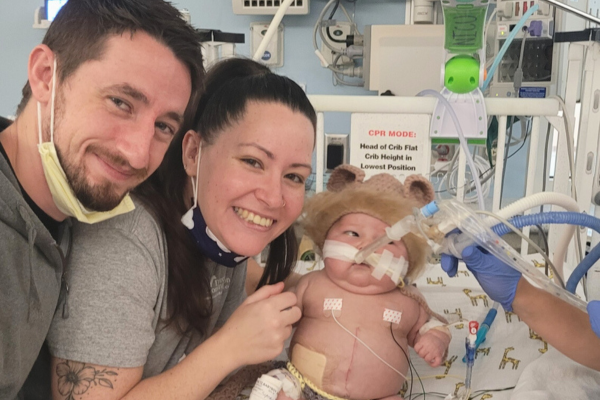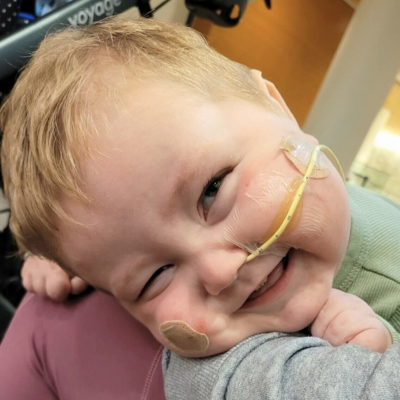July 22, 2025
A rare ARPKD diagnosis changed everything for this family. Now, they’re spreading awareness to help others facing similar challenges.
“We thought we were having a healthy baby. Suddenly, he’s on life support.”
Colton’s parents, Jennifer Schultz and Kyle Boyd, were prepared for life with a newborn, late-night feedings, and teething, not intensive care and urgent consultations with doctors. Then Colton was born with autosomal recessive polycystic kidney disease (ARPKD), a rare, life-threatening condition, and their world was flipped upside down.
But their journey didn’t end there. Today, Colton’s family is sharing his story to raise awareness about ARPKD.
A Surprise Delivery
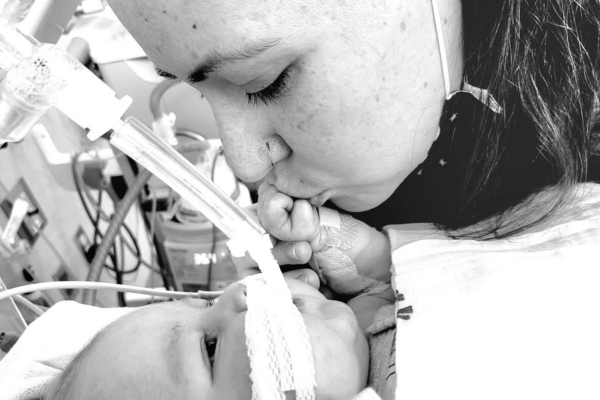
Jennifer’s pregnancy with Colton was considered high-risk early on when doctors discovered she had low amniotic fluid. This condition can increase the risk of pregnancy complications and make delivery more dangerous for the baby.
“Everything looked beautiful at my 20-week scan,” said Jennifer. “The doctor pointed out Colton’s kidneys, lungs, and heart, admiring how perfect he looked.”
Colton grew so well that Jennifer was no longer considered a high-risk patient. But something changed later in her pregnancy.
He stopped moving,” Jennifer recalled. “He became lethargic. I reported it to my OB/GYN office, but the information slipped through the cracks.”
Colton arrived five weeks early on August 4, 2022.
“His shoulders got stuck in the birth canal,” said Jennifer. “A nurse had to push on my stomach to get him out.”
Once delivered, Colton didn’t cry.
“I started yelling, ‘Why isn’t he crying?’” Jennifer said. “He wasn’t breathing. They hit the neonatal intensive care unit (NICU) button and rushed him away.”
Colton suffered a brain bleed and dislocated shoulders during birth. His kidneys and lungs weren’t functioning.
The NICU team stabilized him as best they could, but he needed more advanced care. The next day, Colton was transferred to the Children’s Hospital of Philadelphia (CHOP).
Diagnosed with ARPKD
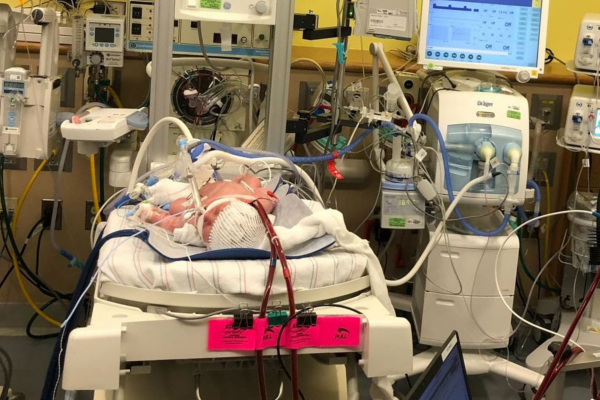
Colton coded twice upon arrival at CHOP. Doctors quickly placed him on ECMO or extracorporeal membrane oxygenation, a type of life support for babies whose hearts or lungs can’t function on their own.
After stabilizing Colton, doctors performed additional tests. They discovered he has ARPKD.
ARPKD is a rare genetic disorder that causes cysts to grow in and on the kidneys. An autosomal recessive disease like ARPKD happens when each parent passes along a recessive gene to the baby. Many babies with ARPKD pass away in utero (inside the womb) or don’t survive long after birth.
“The staff at CHOP didn’t think he’d live more than a few hours or days,” Jennifer said. “I kept asking, ‘When can he go home?’ My son was dying, but my brain couldn’t process it.”
Colton also developed pulmonary hypertension, a type of high blood pressure that affects the lungs and heart due to the size of his kidneys.
“Each kidney was about 9 centimeters,” Jennifer said. “His little belly was so round and he couldn’t breathe.”
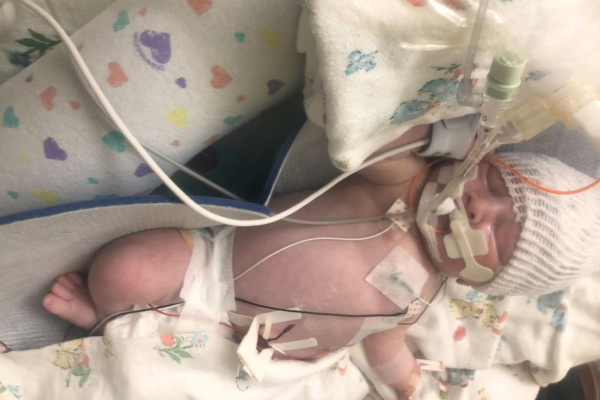
On his third day of life, Colton began continuous renal replacement therapy (CRRT). CRRT is a gentler form of dialysis used for newborns and infants. But more challenges followed.
“He had three brain bleeds by the time he was a week old,” said Jennifer. “Then he got sepsis, went into shock, and nearly died.”
Despite the odds, Colton stabilized again. His care team debated whether he was strong enough for surgery to remove his enlarged kidneys, which had grown to 12 centimeters by his 8th day of life.
“Everyone from nephrology to NICU to palliative care came together,” Jennifer said. “In the end, they decided he could survive it.”
And he did! Doctors performed a double nephrectomy, safely removing both his kidneys.
“His kidneys were 13.5 centimeters and weighed three pounds total,” Jennifer explained. “But that was just the start of our journey.”
Colton then switched to peritoneal dialysis (PD) to manage his kidney failure. PD is a type of home dialysis that uses a dextrose (sugar) solution and a catheter inserted in the lining of the belly to filter out toxins and excess water.
Through every challenge, Colton’s older sibling Julian has been by his side.
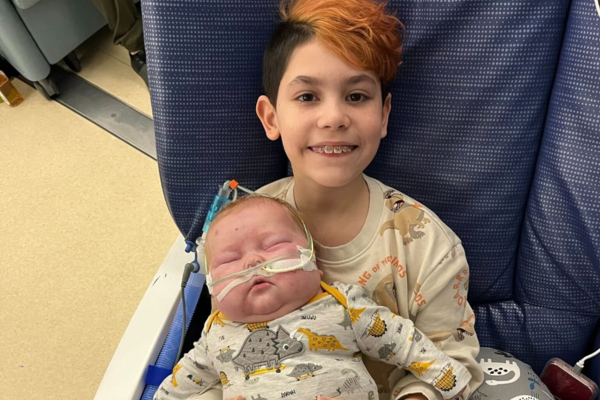
“Their bond is something truly special,” Jennifer said. “When Colton was on ECMO and battling severe hypertension, Julian would talk to him. Just hearing his voice helped Colton’s heart rate and blood pressure. That deep brotherly connection has only grown.”
Is home dialysis right for you or a loved one? Take our quick quiz to find out.
Subscribe today!
Join the NKF Blog Newsletter
Get inspirational stories and kidney disease resources delivered to your inbox every month. You'll gain practical insights and expert advice to help you better understand and manage your kidney health, no matter where you are on your kidney journey.
Finally Home
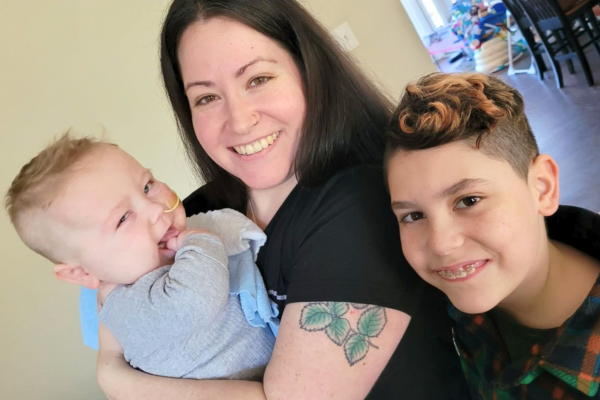
In June 2023, after 10 months in the hospital, Colton finally came home.
“Colton has many diagnoses: kidney disease, cerebral palsy, hypoxic-ischemic encephalopathy (brain damage from lack of oxygen at birth), and seizures. His development is severely delayed.” Jennifer said. “The team did an amazing job preparing us for life at home with him.”
Jennifer quit work to become Colton’s full-time caregiver.
“We have two amazing home nurses who help, but they can’t work with us full-time.” Jennifer said, “Caring for Colton became my full-time job.”
The following month, Jennifer and Kyle met with a pediatric transplant surgeon to discuss kidney transplant options.
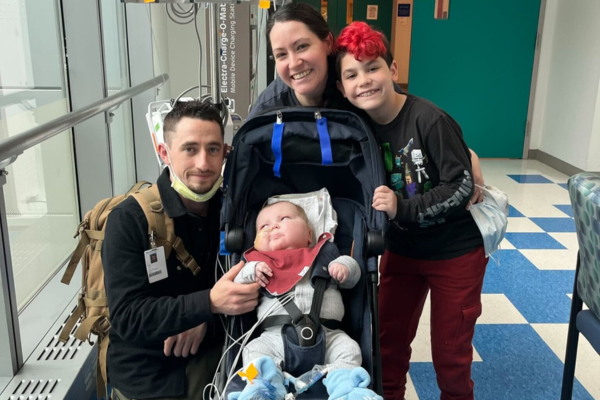
“Colton couldn’t urinate at all, so he received a catheter near his pelvic bone,” Jennifer said. “They used this to help grow his bladder in preparation for transplant.”
While his bladder began to grow, setbacks followed. Colton was hospitalized four times with illnesses like pneumonia and pancreatitis in the six months that followed.
In early 2024, doctors shared more difficult news–Colton wasn’t big enough for a transplant.
He also developed Caroli disease, which causes scarring in the liver and pancreas. Due to issues with his pancreas, Colton stopped tolerating the sugar solution used in PD.
He switched to in-center hemodialysis and began a new formula to improve his nutrition. Now, he is no longer malnourished; he is gaining weight and growing in length.
“Do we move forward with a kidney transplant, knowing he has recurring pancreatitis? Or wait for a combined kidney/pancreas transplant in the future?” Jennifer said. “We’re considering his options.”
Finding a Living Donor
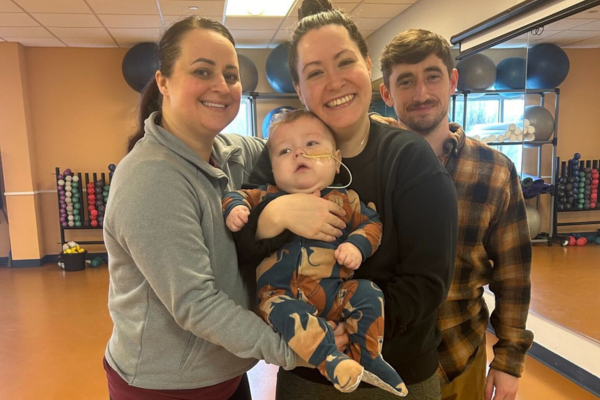
One month after Colton was born, Jennifer and Kyle received testing to confirm they both carry the ARPKD gene. Unfortunately, they did.
“Not being able to donate was devastating,” Jennifer said. “They also found cysts on my kidneys. I’m currently being monitored for PKD.”
That’s when Kyle’s sister, Trista Boyd, stepped up.
“She went through a two-day kidney donor evaluation and was a great candidate—but not a match,” Jennifer said. “Then she found the National Kidney Registry (NKR).”
NKR helps match living kidney donors with patients in need through voucher programs and donor chains. Voucher programs allow donors to list a family member or friend to receive a living donor kidney transplant if they ever need one in the future.
By donating through an NKR Member Center, donors receive access to Donor Shield benefits, including:
- Lost wages: Up to $2,000 per week for up to 12 weeks
- Travel and expense reimbursement: Up to $6,000 for travel, lodging, meals, childcare, and pet care
- Complication protection: Coverage for medical costs, lost wages, and travel if donation-related health issues arise
- Legal support: Free assistance with workplace or insurance discrimination related to donation
“She donated her kidney on February 13, 2024,” Jennifer said. “Her donation set off a chain that helped five people get life-saving transplants.”
Thanks to Trista and the NKR voucher, Colton will be prioritized for transplant when he’s ready.
“It’s incredible that she gave a part of herself, not just to their nephew, but to a stranger,” Jennifer said. “We’re so thankful to Trista for donating along with NKR and National Kidney Foundation (NKF) for spreading awareness and supporting research.”
NKF is here to help you on your kidney journey, whether you need a kidney or are considering donating one. Visit the Kidney Learning Center to watch videos by patients and living donors to learn more about kidney disease, transplant, and living donation.
Together in the Fight
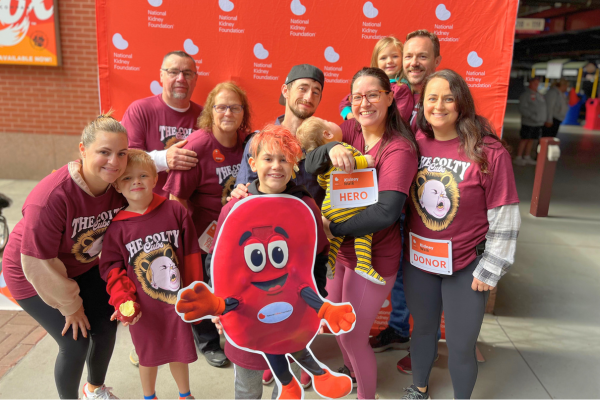
When Jennifer and Kyle first learned that Colton had ARPKD, they felt alone and scared. That changed when their social worker invited them to their local NKF’s Kidney Walk.
“CHOP’s fellows invited us to walk with them,” said Jennifer. “We had an amazing time and left feeling uplifted and supported while also helping raise funds for the National Kidney Foundation’s programs for patients like Colton.”
Kidney Walk also connected them to the larger kidney community.
“We met so many families going through similar things. It was nice not to feel alone,“ said Jennifer. “NKF’s website has also been a helpful resource for our family to learn about dialysis, transplantation, and living with kidney disease. Reading about others’ experiences helps.”
As Jennifer and Kyle connected with more families affected by ARPKD, they began sharing their story more.
“Colton is our little ARPKD warrior who has already made a difference.” Jennifer said, “Doctors at another hospital saved an ARPKD baby’s life using what was learned from his case.”
Jennifer and Kyle hope that talking about Colton’s story more widely will help save more children born with ARPKD in the future.
“The more I share his story, the bigger that difference becomes,” Jennifer said.
Join our kidney community: Find an NKF Kidney Walk near you.
Looking For Support on Your Kidney Journey?
You're not alone.
- Join NKF PEERS: Talk one-on-one with someone who’s been there.
- Join an online NKF Community: Anonymously join conversations, ask questions, and find encouragement.
- Find your local office: Connect with your kidney community in person.
